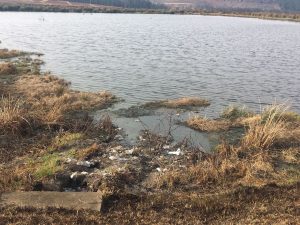CIVIL AND ENVIRONMENTAL ENGINEERING
Environmental Impact Assessments (EIAs)
An EIA is a process of identifying, assessing and reporting environmental impacts associated with a project/activity (e.g. what is the impact on the environment if we build this factory here).
 Emanti have conducted specialist studies related to integrated water management, which is an integral component of an EIA. The primary objective of these studies are to identify the significance of possible environmental impacts of: (1) water use, (2) domestic sewage discharge, (3) construction wastewater discharge, (4) process wastewater discharge, and (5) stormwater discharge. These impacts are normally investigated for the construction, operation and decommissioning phases of a proposed project/activity.
Emanti have conducted specialist studies related to integrated water management, which is an integral component of an EIA. The primary objective of these studies are to identify the significance of possible environmental impacts of: (1) water use, (2) domestic sewage discharge, (3) construction wastewater discharge, (4) process wastewater discharge, and (5) stormwater discharge. These impacts are normally investigated for the construction, operation and decommissioning phases of a proposed project/activity.
The Integrated Water Management specialist study investigates water use and the handling of liquid waste generated on-site and includes confirmation and assessment of available water sources, suggested water treatment processes, liquid wastewater characterization, identifies on-site management of all liquid wastes generated, and the management of possible emergency conditions (e.g. spillage). The study normally includes the following:
Water
• Describe and quantify the water quality and quantity requirements for different uses (e.g. construction, domestic, etc.).
• Review the existing water use permit, identify the source of any potable or recycled water required for the project/activity, and confirm availability within the region for the provision of these water requirements.
• Highlight any potential sources of conflict that might arise regarding water availability and supply to the proposed project/activity.
• Assess the predicted quality of source water for the proposed project/activity against design requirements, including a discussion of the implications thereof.
• Briefly describe the onsite water treatment facilities, if any.
 Wastewater and Stormwater
Wastewater and Stormwater
• Identify and quantify all wastewater streams (e.g. sewage) and stormwater.
• Review of proposed site management methods to minimize/prevent on-site spillages and associated water pollution.
• Review the spill contingency plan and management actions that are implemented in response to an undesired event (e.g. spillage, underground leakages, seepage).
• Identify potential sources of environmental concern (e.g. erosion), sources of contamination, constituents of concern and their expected concentrations (if possible), and an assessment of the impacts thereof.
• Describe the proposed wastewater/stormwater disposal approach and identify the points of discharge for different wastewater/stormwater streams.
• Discuss the potential constraints (e.g. legislative, environmental or practical) associated with wastewater/stormwater disposal.
• Describe the onsite wastewater treatment facilities (if any) and stormwater protection facilities/features (e.g. bunding, oil/water separators, etc.).
In addition to the above, the specialist study also includes the following aspects:
• Describe the affected environment and identify the key issues during the construction, operation and decommissioning phases.
• Recommend measures and management actions to mitigate potentially negative impacts.
• Specify the potential impact as well as potential cumulative impact of the development.
• Identify opportunities for improving integrated water management and promoting water conservation (if necessary)
• Confirm permit/license requirements (e.g. National Water Act, by-laws, Water Services Act, General Authorization, etc.)
• If possible, a preliminary water balance is also developed.
If you would like Emanti to conduct an integrated water management specialist study for an EIA, please contact us.






